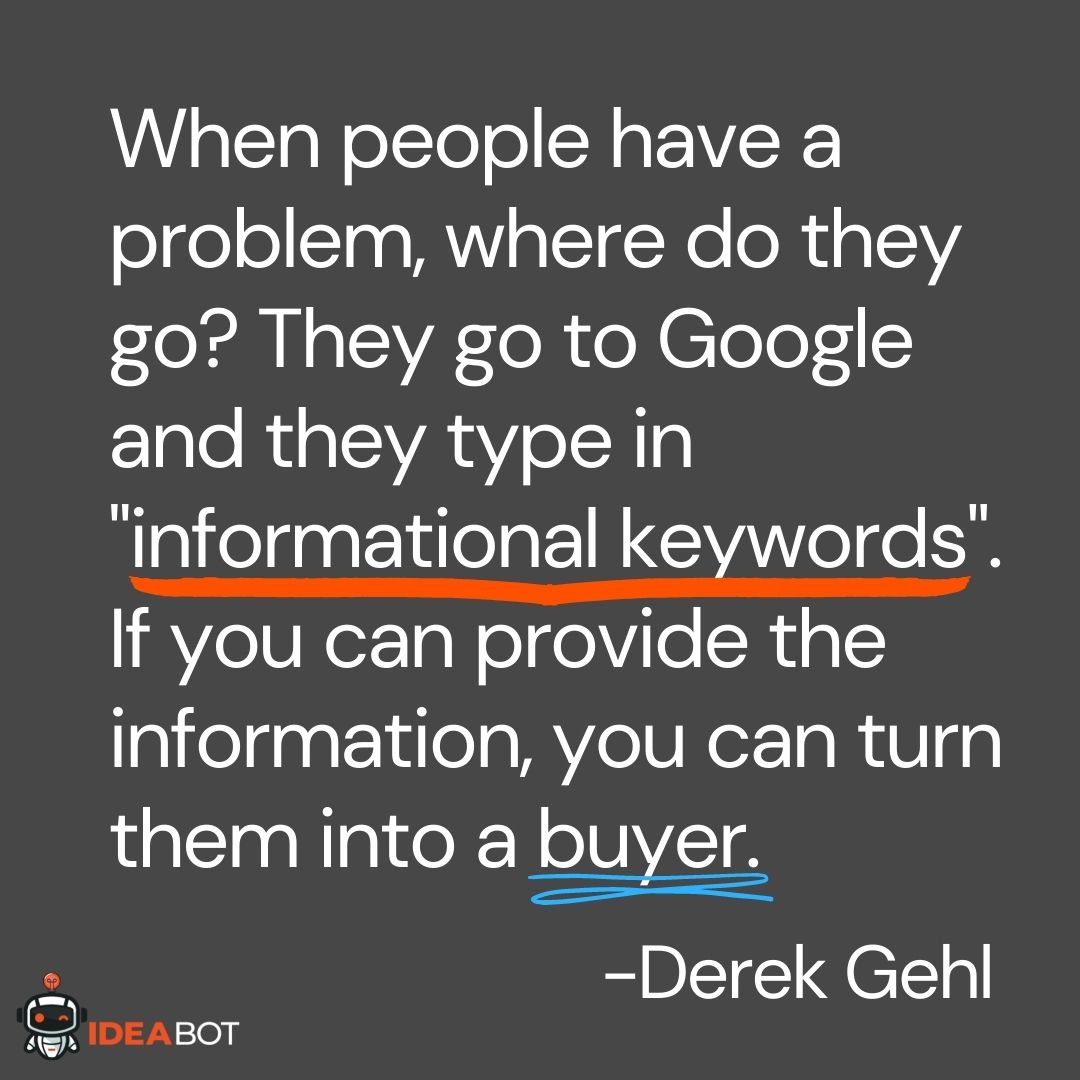Keywords Research 101:
3 Categories of Keyword Intent
Video Transcript - Keywords Research 101
Why are keywords so important?
So much of what we do in online marketing and online business is based around keywords. We think about the best type of traffic or an organic search engine optimization ranking in Google that's based on keywords.
Google AdWords, pay per click are based on keywords. YouTube marketing is also based on keywords - so many platforms today that have a search feature built into them, it comes down to keywords.
The fact is, though, is all keywords are not created equal.
What I want to do today in this little Keyword Research 101 lesson. I want to teach you about a very important keyword concept. And that is keyword intent.
What is keyword intent? It is the intention of somebody when they type a keyword into Google and depending on what their intention is, for a given keyword dictates how valuable they could be to us.
Another way to put it is how much effort we want to put into ranking for that keyword or how much we're willing to spend to get a click when somebody searches that keyword.
Keyword intent can be broken down into three different categories.
Category #1: Navigational Keywords
Navigational keywords is when somebody goes to Google or into any search functionality or search engine on the internet and they're just looking to find something.
It could be a site or it could even be a physical address or somebody's looking for their dentist or somebody typing in, looking for the login page for their bank.

I do this all the time, I use zoom constantly. And when I need to get to my zoom account and Google's open, just by default, I just click on the Google bar and type in zoom, and then click the link.
Why?
Because that's how people find stuff these days.
Here's the thing with navigational keywords is they don't really have much value to us. Navigational means they're looking for somebody else. And lastly, for us, it offers no valuable value as a business.
You might be thinking: well, I have a hardware store and if I showed up whenever somebody was looking for their local Home Depot, that would be huge.
Yeah, okay.
No.
What, why?
Because those people are looking for Home Depot, they're not looking for you. They have something very specific in their mind, they want to locate it, and that's where they want to go.
We don't bother with those. And the fact of the matter is, it ain't ever going to help us because Google wouldn't rank us for that stuff.
Anyway, navigational keywords, gone.
Category #2: Informational Keywords
This makes up a huge percentage of the search volume on the internet.
This is people who are going to Google and typing in keywords that have a very clear intent that they're not looking to navigate somewhere.
They're not necessarily looking to buy something. They're just looking for info, they want information, they want to learn something, they want to fix something, they're looking for a solution for something.
They're going to Google and typing in keywords that would indicate that they're not ready to pull out their wallet, but they would like some information. These are super valuable keywords.
And this can be a massive source of traffic for businesses. Because nowadays, when people need information when they have a problem: where do they go? They go to Google and they type in informational keywords.

Don't expect these people just to click and buy right away.
But if you can create valuable information for people and you can present that to people when they search for those key words, that is the first step in a relationship that you can then nurture and build so that when they are ready to make that purchase, they will make that purchase with you.
Just about every niche imaginable, there's information searches.
You might think: well what about clothing? Do people search for information?
Sure they do.
"What's the best color shirt for somebody with blue eyes?"
"What's the best cut of a suit for somebody with this build?"
"What's the most popular pattern for spring 2021?"
Those are people that are looking for information, we can apply this to just about any niche. When you can give people quality information that helps answer those questions, when they're ready to make the purchase, you're the person that they come to if you've done that.
Category #3: Transactional Keywords
These are the most valuable among the three. These are what we call transactional keywords.
Why are these keywords so valuable?
When somebody searches these keywords, we know that they're just about ready to make a buying decision.
Why?
Because they're searching keywords that would indicate that they're ready to buy. These are people that are typing in specific types of products.
These are people that are typing in keywords like buy, or where do I get or brand names, or very specific descriptions of the products they're looking for. If you happen to offer those products, well, fantastic.
That's a super valuable visitor, because they're almost ready to make the purchase.
Which category should I focus in?
Where are we going to focus most of our effort? Transactional keywords are golden, for sure. But for the bulk of your keyword research, when you're starting or growing your online business, informational keywords are important because this is where the bulk of people are searching.
They're looking for information on stuff. And you're going to become that source of information in your given niche.
You're going to establish yourself as that authority as that resource of quality information.
When the buying decision is going to be made when and they're ready to transact, they don't go to Google and type in those transactional keywords. They go to you and they're ready to make that purchase.
How do I start with Keyword Research?
How do we use what I just talked about here? When we're doing digital marketing when we're doing niche market research?
Simple.
Ultimately, we want to look at these two categories differently. When we are targeting specific keywords, we're going to treat these two categories differently.
When somebody is searching for information, we're not going to try and sell them something right away. And when somebody is searching that would indicate that they're ready to transact and buy something, we don't want to push them through a whole bunch of information, we want to get them to the checkout as quickly as possible.
Understanding the difference in these key words, and these keyword groups is going to allow us to build separate pathways in our business separate funnels that treats them differently and gets a far higher result out of both.
Transactional is going to be the bulk. If you can do it, fantastic. But informational keywords, it's about building an audience building authority and sharing that information.
Now when you go and do your keyword research, you should classify these and go, "Okay, is this a transactional keyword? Or is this an information keyword, and if it's an information keyword, is the intent clear enough that I really know what they're looking for?"
I want to share one big mistake so many people make in keyword research.
It is when they are looking at informational keywords, they will go after general keywords, where they think they have a clear intent and a clear offer that they could present to that person. Only to find out that they don't.
I want to tell you a little story of how I learned this lesson. And this goes back to about 2006. I had been online for six, seven years.
We had one of the biggest companies teaching people how to build businesses online in the internet marketing space.
We've written courses, we have software, we're doing amazing things, and I decided that I wanted to buy the domain internetmarketing.com.
Why?
Because that's what we did internetmarketing.com. In fact, for me, at that point, I'll be honest, it was a bit of ego. I thought when somebody goes to internetmarketing.com, I want my personal blog to come up.
I had started negotiating on this domain and it started up in the six-figure range and and I was like, "No, I'm not gonna pay that."
We went back and forth and back and forth. And honestly, I didn't think I was gonna get it. A few months passed and the gentleman who was selling it, he was trying to buy a piece of real estate and he needed a deposit, and he needed it fast.
So I got internetmarketing.com back then for $20,000. Now, for that domain, that was actually a pretty dang good deal.
And my goal, then was I wanted to rank number one, if somebody search internet marketing Google, I would come up number one. Back then exact match domain names were a very powerful indicator for Google.
If you had the exact match for a keyword, you would probably rank for it quite easily. I got the domain, I set my blog up, and I'm like, Okay, I'm going to rank for internet marketing.
And I did.
For the longest time, when you searched internet marketing, my site came up number one.
Here's what I learned very quickly.
Every month, hundreds of thousands of people were typing in internet marketing into Google. A lot of those people would come to my site, but they wouldn't subscribe and they wouldn't buy, they wouldn't engage.
Why?
Because although it was an informational search, it was far too general.
Although, I thought, their intent is going to be they want to know about internet marketing?
Sure, a tiny percentage of them did but a large percentage of them were just exploring when somebody types in something like internet marketing, or dog training, or, or cars or truck or whatever that is. We don't really know what it is they're looking for.
We see these keywords like internet marketing that had massive search volume, and we get all excited. And we go out, we put all this time and resource and if if we can rank for them, we typically find out that it was pretty crappy traffic because there was no clear intent.
Internet Marketing is a massive space. They could have been looking for traffic conversion, they could have been looking for how to get an internet marketing education in a university. Who knows what they were looking for.
What I know is most of them aren't looking for me. So it didn't do me any good other than stroke my ego, that was it. Full stop.
When you are looking at these informational keywords, the more descriptive they are, or long-tail in many cases, the clearer the intent you have.
The clearer the intent you have, the more valuable they become. Because you're now able to craft an offer that directly speaks to the intent that cause them to search that word, which results in a far higher conversion, better engagement, more customers.
The fact to the matter is, the ones that are very descriptive and have clear intent, typically are lower volume, much higher conversion, but overall they also have lower competition.
Conclusion
That's Keyword Research 101. Where can you get amazing keyword research without spending a fortune?
Check out IdeaBot.ai.
I built IdeaBot for new digital entrepreneurs who didn't have the budget to spend 50, 60, $100 a month on expensive keyword research tools to give you access to incredible keyword research straight from authority databases without having to spend a fortune.
In fact, you know how much it costs to get started?
Nothing. It's free.
You can research 100 keywords every single month in IdeaBot.ai.
If you don't have a keyword research tool, and you don't want to spend a fortune on it, I recommend you head over to IdeaBot and sign up for free and start looking for your hot keywords whether it's for niche markets, whether it's for SEO, whether it's for AdWords, whatever it's for this is a valuable tool.
